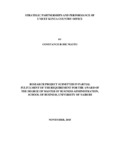| dc.description.abstract | The aim of the study was to determine the effect of Strategic Partnerships on the Performance of UNICEF Kenya. The research adopted a case study research design. This study has five chapters. Chapter one describes the background of the study. This chapter also introduces the conceptual argument of the study. In this chapter also the context of the study is discussed. This gives a description of the United Nations in Kenya, which is the context of study focusing on the United Nations Children Fund in Kenya. In Chapter two the literature review, and the theoretical foundation is discussed. Chapter three gives the research methodology where the research design, data collection and data analysis is discussed. This study was a case study of United Nations Children Fund. The case study involved a careful and complete examination of the entire units and Organization at large and embraced depth rather than breadth of the study. Both primary and secondary data was collected for this study. Primary data was collected through an interview guide that carries questions pertaining partnership strategy, the challenges encountered in the process of implementing the strategy in order to achieve results. The interview guide consisted of open-ended unstructured question to allow greater depth and breadth of responses and was administered through personal interviews to Unicef staffs namely Section chiefs, Program Specialists/Officers and Programme Assistants; Implementing Partners were also interviewed namely Program Officers/Managers. Secondary data consisted of various literatures about the company as recorded in the Organization profile, organization newsletters, annual reports, quarterly progress reports, key speeches as well as spot check reports and publications. Chapter four discussed the findings of the study which revealed that the Organization achieves its performance through implementing partnership strategy. It is through engaging patners that Unicef can have its programmes implemented and results achieved. This is done through conducting a competitive bidding process to select the best partners with the required technical capacity to undertake the programmes. However this study revealed that in implementing partnership strategy, there are many challenges that face the implementation and hinders results achievement. Despite investing heavily in the partnership strategy Unicef Kenya still has not achieved the desired results as it still faces challenges including but not limited to unreported funding which is over the allowable 6 months. The final chapter of this study is chapter five which gives the summary of the findings, conclusion and the recommendation of the study. This chapter also discusses the implications of the study to the policy makers, the theory the implication of the study in practice and especially to the practicing managers. It also gives the suggestions for further research by upcoming academicians and researchers. | en_US |

